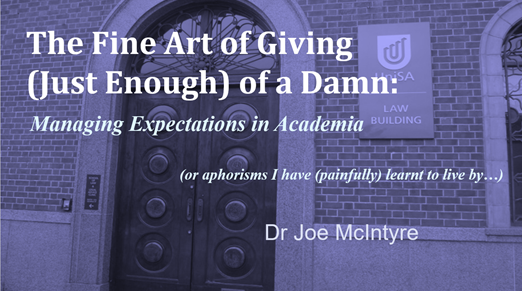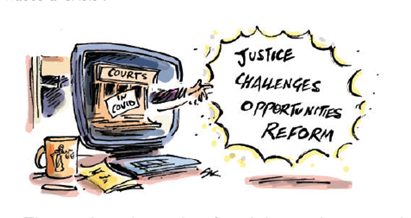#Pandemicademia - A Thread on Online Intensives (Despair all thee who enter here...)
I am currently in the middle of delivering an intensive course on Remedies - all online. It is exhausting. Maintaining student engagement is... problematic. I thought I would share a few thought
I am currently in the middle of delivering an intensive course on Remedies - all online. It is exhausting. Maintaining student engagement is... problematic. I thought I would share a few thought
Firstly, I think the students are finding it very hard to find the time to keep up with the materials/lectures/seminars. This is particularly acute for an intensive. In F2F Intensives there is recognition that students need to dedicate time and attend to be able to cope
The online context has been very different. Buy in to start with was fine - 75% attended the first lecture (which I delivered live on Zoom) [as an aside this is a good tip for those delivering new online courses, as it allows Q and connection]
Subsequent recorded lectures have seen a slow but steady fading of viewership (1 student watched the last lecture....) 



In contrast, I will consistently get 70% attendance at my Admin law lectures when taught F2F. That figure will start higher, but remain pretty consistent throughout the semester
We are consistently getting about 50% attendance at seminars - but very poor engagement/preparation. Normally students in intensives attend and engage. Online, we are finding silence in breakout rooms is common. Preparation non-existent
This is not me ragging on my students.
Rather, I think the intersection of Online + Intensive is making the problem acute. Many students are trying to attend online seminars from work ("Oh, I can talk I am at work...")
Rather, I think the intersection of Online + Intensive is making the problem acute. Many students are trying to attend online seminars from work ("Oh, I can talk I am at work...")
Without the dedicated lecture time, they are trying to find time to fit viewing the lecture in between other commitments - the very 'flexibility' of online is counterproductive in this context.
We are (as Victoria is reminding us) still in the middle of a pandemic, and background levels of exhaustion and anxiety remain very high. Trying to find dedicated time for intensive studies in this context is problematic.
SO what has worked? We slowed down the course - made it 3 weeks of teaching instead of 2 (a benefit of online delivery was that this was easy)
I negotiated smaller seminars (2 x 20 students instead of 40) in recognition of the difficulty of online delivery of skills
I negotiated smaller seminars (2 x 20 students instead of 40) in recognition of the difficulty of online delivery of skills
Taken together, these have the effect of giving students more time to stay on top of things, and more space for dedicated learning.
I think that has helped (Though it loses something of the 'sprint' element of classic intensive, I think that would have been soul destroying)
I think that has helped (Though it loses something of the 'sprint' element of classic intensive, I think that would have been soul destroying)
I have found that the slides are increasingly important to learning in this context - and am spending much more time in trying to visually convey information.
Eg, these four slides help visualise different limiting principles:
Eg, these four slides help visualise different limiting principles:

I have tried to streamline and limit readings (shout-out to the magnificent @DrKatyBarnett for all her support).
But given students are no longer managing to keep up with the lecture, I think it is safe to say they are not keeping up with even these limited readings
But given students are no longer managing to keep up with the lecture, I think it is safe to say they are not keeping up with even these limited readings
Student are getting frustrated with each other for not engaging/talking/preparing - My breakout rooms in Torts were really productive learning spaces, as everyone was at the same level, and learnt (together) how to do online learning
In an intensive, we don't have that same capacity to develop those very new skills, with students coming in at different levels and acute time pressures. We have had to abandon some breakout room sessions as there was no meaningful engagement or dialogue.
Again, I want to be clear - this is not ragging on my students. They are trying. But the demands of:
ONLINE (with new skills required, new demands of time management, high cognitive loading) +
INTENSIVE (no time, dependent upon peer support/engagement for energy etc) is hell
ONLINE (with new skills required, new demands of time management, high cognitive loading) +
INTENSIVE (no time, dependent upon peer support/engagement for energy etc) is hell
After teaching 2 large courses online for the second half of last semester, I thought we had this one.
But I had not anticipated how difficult this nexus of ONLINE + INTENSIVE would be (particularly for a doctrinal course)
But I had not anticipated how difficult this nexus of ONLINE + INTENSIVE would be (particularly for a doctrinal course)
I still think the way to conceptualise 'normal' online delivery is "80% as good; Twice the time/effort" (which is a great bargain when the alternative is nothing...)
However, those figures just don't seem to stack up for intensives
However, those figures just don't seem to stack up for intensives
The compression of time means the additional cognitive load becomes overwhelming; the additional time commitment irrecoverable. Students fall further and further behind.
In short: DON'T DO IT
Online Intensives (particularly for doctrinal courses) are an unholy marriage of the darkest aspects of both components. They are unfair on students; crushing on staff.
Online Intensives (particularly for doctrinal courses) are an unholy marriage of the darkest aspects of both components. They are unfair on students; crushing on staff.
Thanks though, to @_LisaParker for her amazing efforts in delivering the course with me, and all my students who are trying so hard to make this work.
Sorry to you all...
Sorry to you all...
(I hope others have had a better experience than me, and I would love to hear your thoughts and tips)
• • •
Missing some Tweet in this thread? You can try to
force a refresh










